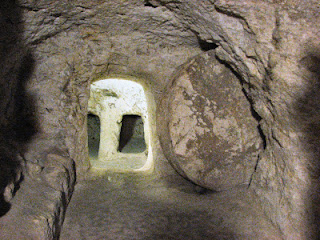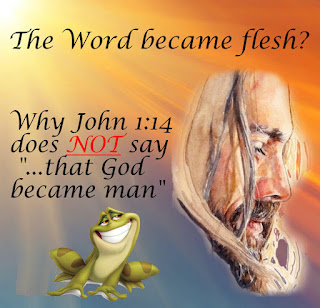In the beginning was...(Or, John 1:1 is not about the Genesis Creation)
Notes for
One God Report Podcast #17. Exegesis of
John 1, part 1 “In the beginning was…”
Bill
Schlegel with Rivers O Feden
As we begin an exegesis of the Prologue to the
Gospel of John (John 1:1-18), in this podcast we give more evidence (see this previous
podcast) for why the Prologue should be understood as an introduction to
the ministry of Jesus the Messiah, and not as a direct reference to the Genesis creation.
1. The phrase “In the beginning” and the word “word” of John 1:1 are best interpreted by comparing them first and foremost with other uses in the Gospel of John, in other Johannine literature, and then in other New and Old Testament literature. "In the beginning" occurs other times in the New Testament, and over 30 times in the Old Testament, none of which refer to the Genesis creation. When this comparison is made it can be seen that “In the beginning…” of John 1:1, while most likely being an allusion to Genesis 1:1, is not a direct reference to the Genesis creation account. In other words, John’s prologue does not begin with a commentary on the Genesis creation.
3.
The structure of John’s
prologue breaks down into three paragraphs:
1.
1:1-5
2.
1:6-13
3. 1:14-18
Past tense verbs dominate in the prologue, as the author describes events that happened in real time and place. The author is writing from the perspective of an eye witness who is familiar with the life of Jesus from the time of the testimony of John the Baptist to the resurrection and exaltation of Jesus to the Father (1:18, 20:1, 17). While past tense verbs dominate the author's testimony, in each of the three paragraphs of the Prologue, a present tense verb brings the scene into the present:
1:5 – “the light shines in the darkness”
1:12 – “all…who believe in his name”
1:18 – “the unique son, who is in the bosom of the Father”
These three present tense verbs which bring the narrative of each paragraph into the present are evidence that the prologue is concerned with the ministry of Jesus and how that ministry affects the reader, and not with the Genesis creation.
4. John the Baptist plays a significant role in the prologue, especially from verse 6 (also v. 15, 19ff, and even v. 2 “this one” contrast with “this one” of v. 7). The concern of the author to define or clarify the relationship of the Baptist to Jesus is evidence that the word, light, and life mentioned in the prologue are metaphors used to describe the human person Jesus, and that the Prologue is not a commentary on Genesis 1.
5. A comparison of the grammar and syntax (word order) between the Prologue and Genesis 1 shows that John is not commenting on Genesis 1.
The words for “create” and “make” which occur in the Genesis creation (Hebrew and/or Greek equivalents) do not occur anywhere in John’s Prologue.
Neither is the word “logos/word” found in the Genesis creation account. In fact, the singular "logos/word" does not occur anywhere in the Greek version of Genesis. Exegesis is a semantically loaded exercise. Since the word "logos" does not occur in the Genesis creation account, it is very unlikely that the author of the Gospel of John intended his readers to understand his opening statement as a commentary on Genesis creation.
The Hebrew word "davar" is the equivalent for the Greek "logos". Neither does the Hebrew word "davar" occur in the Hebrew Genesis creation account.
In addition to the non-existence in the Prologue of the Greek words for "create" and "make/made", much language that is in Genesis is missing from the Prologue, e.g., “heavens, earth, sun, moon, stars, plants, trees, animals” etc.
“In the beginning” of John alludes to Genesis, but a comparison of the next words of Genesis are very different.“In the beginning _ created _ God” (Genesis).
“In the beginning _ was _ the Word” (John).
6. All the language of the Prologue that alludes to Genesis is re-iterated later in the Gospel of John itself, and applied to the ministry of Jesus. Words like “beginning, darkness, light, life” are explicitly connected to the ministry of Jesus in the Gospel. The application of the same language of the Prologue to Jesus in the body of the Gospel of John is evidence that the Prologue is describing the human person Jesus.
7. Allusions in the Prologue are not limited to the Genesis creation account. The Prologue also has allusions to the Abraham-Isaac narrative (Gen. 22, cf. John 1:14, 18) and to Moses and the Israelite exodus (1:5, 6, 11, 14, 17). This is evidence that the author is alluding to a wider array of Old Testament parallels, and once again, that the Prologue is not a commentary on the Genesis creation.
8.
If “In the beginning” of
John 1 is not a direct reference to the Genesis creation, “deity of Christ” and
Trinitarian theological interpretation of the first chapter of John is wrong.



Comments